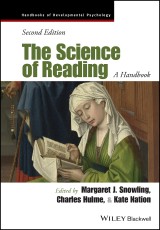Details
The Science of Reading
A HandbookWiley Blackwell Handbooks of Developmental Psychology 2. Aufl.
|
46,99 € |
|
| Verlag: | Wiley-Blackwell |
| Format: | EPUB |
| Veröffentl.: | 12.05.2022 |
| ISBN/EAN: | 9781119705130 |
| Sprache: | englisch |
| Anzahl Seiten: | 608 |
DRM-geschütztes eBook, Sie benötigen z.B. Adobe Digital Editions und eine Adobe ID zum Lesen.
Beschreibungen
<p><b>Provides an overview of state-of-the-art research on the science of reading, revised and updated throughout </b> <p><i>The Science of Reading </i>presents the most recent advances in the study of reading and related skills. Bringing together contributions from a multidisciplinary team of experts, this comprehensive volume reviews theoretical approaches, stage models of reading, cross-linguistic studies of reading, reading instruction, the neurobiology of reading, and more. Divided into six parts, the book explores word recognition processes in skilled reading, learning to read and spell, reading comprehension and its development, reading and writing in different languages, developmental and acquired reading disorders, and the social, biological, and environmental factors of literacy. <p>The second edition of <i>The Science of Reading </i>is extensively revised to reflect contemporary theoretical insights and methodological advances. Two entirely new chapters on co-occurrence and complexity are accompanied by reviews of recent findings and discussion of future trends and research directions. Updated chapters cover the development of reading and language in preschools, the social correlates of reading, experimental research on sentence processing, learning to read in alphabetic orthographies, comorbidities that occur frequently with dyslexia, and other central topics. <ul> <li>Demonstrates how different knowledge sources underpin reading processes using a wide range of methodologies</li> <li>Presents critical appraisals of theoretical and computational models of word recognition and evidence-based research on reading intervention</li> <li>Reviews evidence on skilled visual word recognition, the role of phonology, methods for identifying dyslexia, and the molecular genetics of reading and language</li> <li>Highlights the importance of language as a foundation for literacy and as a risk factor for developmental dyslexia and other reading disorders</li> <li>Discusses learning to read in different types of writing systems, with a language impairment, and in variations of the home literacy environment</li> <li>Describes the role of contemporary analytical tools such as dominance analysis and quantile regression in modelling the development of reading and comprehension</li></ul><p>Part of the acclaimed <i>Wiley</i> <i>Blackwell Handbooks of Developmental Psychology </i>series, the second edition of <i>The Science of Reading: A Handbook </i>remains an invaluable resource for advanced students, researchers, and specialist educators looking for an up-to-date overview of the field.
<p>List of Contributors</p> <p>Preface</p> <p>Acknowledgements</p> <p><b>Part 1: Skilled Reading</b></p> <p>1. Progress in Reading Science: Word Identification, Comprehension, and Universal Perspectives<br /><i>Charles Perfetti and Anne Helder</i></p> <p>2. Models of Word Reading: What Have We Learned?<br /><i>Mark S. Seidenberg, Molly Farry-Thorn and Jason D. Zevin</i></p> <p>3. Word Recognition l: Visual and Orthographic Proccesses<br /><i>Jonathan Grainger</i></p> <p>4. Word Recognition ll: Orthography-Phonology<br /><i>Marc Brysbaert</i></p> <p>5. Word Recognition lll: Orthography-Meaning<br /><i>Kathleen Rastle</i></p> <p><b>Part 2: Learning to Read and Spell</b></p> <p>6. The Foundations of Literacy<br /><i>Lorna G. Hamilton and Emma Hayiou-Thomas</i></p> <p>7. Learning to Read Words<br /><i>Anne Castles and Kate Nation</i></p> <p>8. Learning to Spell Words<br /><i>Nenagh Kemp and Rebecca Treiman</i></p> <p>9. Individual Differences in Learning to Read Words<br /><i>Donald L. Compton, Laura M. Steacy, Yaacov Petscher, Valeria M. Rigobon, Ashley A. Edwards, and Nuria Guiterrez</i></p> <p>10. Teaching Children to Read<br /><i>Robert Savage</i></p> <p><b>Part 3: Reading Comprehension</b></p> <p>11. Reading Comprehension: Discourse<br /><i>Paul van den Broek and Panayiota Kendeou</i></p> <p>12. Reading Comprehension: Sentence Processing<br /><i>Simon Liversedge, Chuanli Zang, and Feifei Liang</i></p> <p>13. Modelling the Development of Reading Comprehension<br /><i>Arne Lervag and Monika Melby-Lervag</i></p> <p>14. Children's Reading Comprehension Difficulties<br /><i>Kate Cain</i></p> <p><b>Part 4: Reading and Writing in Different Languages</b></p> <p>15. Reading and Reading Disorders in Alphabetic Orthographies<br /><i>Marketa Caravolas</i></p> <p>16. Reading and Reading Disorders in Chinese<br /><i>Catherine McBride, Xiangzhi Meng, Junren Lee and Dora Jue Pan</i></p> <p>17. Reading the Akshara Writing System<br /><i>Sonali Nag</i></p> <p><b>Part 5: Reading Disorders</b></p> <p>18. Acquired Disorders of Reading<br /><i>Anna Woollams, Matt Lambon-Ralph and Karalyn Patterson</i></p> <p>19. Developmental Dsylexia<br /><i>Richard K. Wagner, Fotena A. Zirps and Sarah G. Wood</i></p> <p>20. Comorbidity of Reading Disorders<br /><i>Kristina Moll</i></p> <p>21. Learning to Read with a Language or Hearing Impairment<br /><i>Suzanne M. Adlof, Jessica Chan, Krystal Werfel and Hugh W. Catts</i></p> <p><b>Part 6: Social and Biological Correlates of Reading</b></p> <p>22. The Genetics of Dyslexia: Learning from the Past to Shape the Future<br /><i>Silvia Paracchini</i></p> <p>23. Genetic and Environmental Influences on Learning to Read<br /><i>Callie W. Little and Sara A. Hart</i></p> <p>24. The Neurobiology of Literacy<br /><i>Jason Yeatman</i></p> <p>Glossary</p> <p>Index</p>
<p><b>Margaret J. Snowling</b> is Professor of Psychology and President of St. John’s College, University of Oxford. She is Fellow of the British Academy, Fellow of the Academy of Medical Sciences and Fellow of the Academy of Social Sciences. She is Past President of the Society for the Scientific Study of Reading and served on Sir Jim Rose’s Expert Advisory Group on provision for Dyslexia. She was appointed CBE for services to science and the understanding of dyslexia in 2016.</p> <p><b>Charles Hulme</b> is Professor of Psychology and Education Research Fellow at Brasenose College, University of Oxford. He is Fellow of the British Academy, Fellow of the Academy of Social Sciences, and a Fellow of Academia Europaea. He is an expert on reading, language, and memory processes and their development. He received the Marion Welchman International Award for Contributions to the study of Dyslexia from the British Dyslexia Association in 2019.</p> <p><b>Kate Nation</b> is Professor of Experimental Psychology at the University of Oxford and a Fellow of St. John's College. She is a Fellow of the Academy of Social Sciences. Her research concerned with language processing has been recognized by the British Psychological Society and the Experimental Psychology Society. She received the Celebrating Impact Prize from the Economic and Social Research Council in 2020.</p>


















